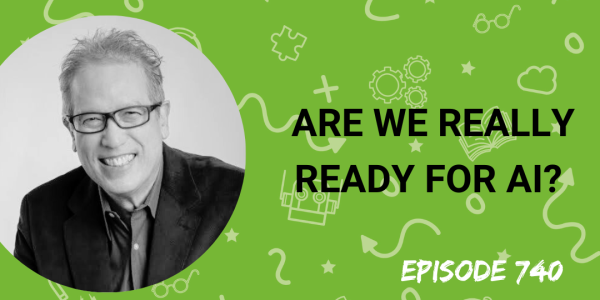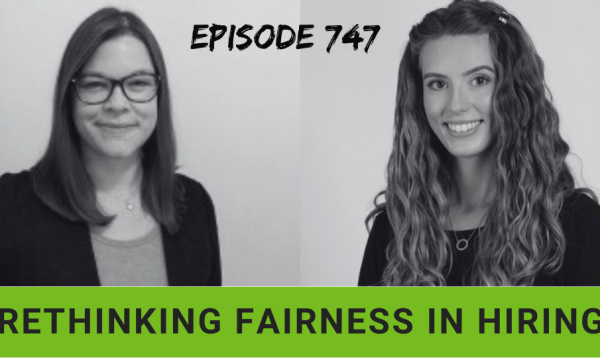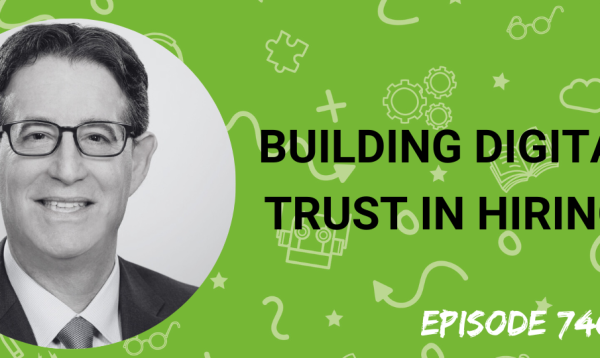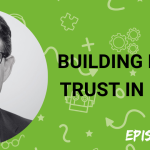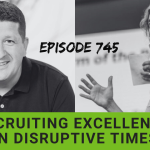We’ve lived through technology revolutions before. Personal computers. The Internet. Smartphones. Social media. Each felt transformative at the time, reshaping how we work and communicate.
But something fundamentally different is happening now. AI learns from every interaction and improves with each release. Yet the signals are confusing. Some pilots are failing, and the hype levels are off the scale. Meanwhile, some companies are reporting the potential for hundreds of millions in savings, capability benchmarks are doubling every seven months, and entire organizational structures are being reimagined around human-AI collaboration.
So how do employers cut through the noise and prepare for such a fundamental shift?
My guest this week is Michael Tchong, a futurist and founder of Ubertrends Academy. In our conversation, Michael explains what makes this revolution different, how to spot true long-term trends beyond the hype, and shares practical strategies for navigating the transformation ahead.
In the interview, we discuss:
• Are we prepared for the coming disruption?
• Signals and Uber trends
• Why AI is unlike past revolutions
• Separating the hype from the real transformation signals
• Early adopters versus mainstream users
• Building hybrid human-AI organizations
• The coming wave of job displacement
• Practical upskilling strategies you need to implement
Follow this podcast on Apple Podcasts.
Follow this podcast on Spotify.
Transcript
00:00
Matt Alder
Every tech revolution promises change, whether it was personal computers, the Internet, social media or smartphones. So why is AI fundamentally different? And what makes this disruption unlike anything that we’ve seen before? Keep listening to find out. Support for this podcast comes from smart recruiters. Are you looking to supercharge your hiring? Meet Winston Smart Recruiter’s AI powered companion. I’ve had a demo of Winston. The capabilities are extremely powerful and it’s been crafted to elevate hiring to a whole new level. This AI sidekick goes beyond the usual assistant, handling all the time consuming admin work, so you can focus on connecting with top talent and making better hiring decisions. From screening candidates to scheduling interviews, Winston manages it all with AI precision, keeping the hiring process fast, smart and effective. Head over to smartrecruiters.com and see how Winston can deliver superhuman results.
01:10
Michael Tchong
There’s been more of scientific discovery, more of technical advancement and material progress in your lifetime and mine than in all the ages of history.
01:24
Matt Alder
Hi there. Welcome to episode 740 of Recruiting Future with me, Matt Alder. Recruiting Future helps talent acquisition teams drive measurable impact by developing strategic capability in foresight. Influence, talent and technology. This episode is about foresight and technology. We’ve lived through technological revolutions before. Personal computers, the Internet, smartphones, social media. Each one felt transformative at the time, reshaping how we work and communicate. But something fundamentally different is happening now. AI learns from every interaction and improves with every release. Yet the signals are confusing. Some pilots are failing and the hype levels are off the scale. Meanwhile, some companies are reporting the potential for hundreds of millions in savings capability benchmarks are doubling every seven months, and entire organizational structures are being reimagined around human AI collaboration. So how do employers cut through the noise and prepare for such a fundamental shift?
02:39
Matt Alder
My guest this week is Michael Chong, futurist and founder of Ubertrends Academy. In our conversation, Michael explains what makes this revolution different, how to spot the true long term trends beyond the hype, and shares practical strategies for navigating the transformation ahead.
02:58
Michael Tchong
Hi, Michael, and welcome to the podcast.
03:01
Michael Tchong
Thanks for having me, Matt. It’s fun to be here.
03:05
Michael Tchong
A pleasure to be talking to you. Please, could you introduce yourself and tell everyone what you do?
03:11
Michael Tchong
Okay. I am Michael Chong. I’m a futurist and founder of Uber Transit Academy. I map big waves that change behavior and translate them into practical moves.
03:23
Matt Alder
Fantastic.
03:23
Michael Tchong
So let’s just start with that. How do you be a futurist? What is it that you look for? How do you kind of help people understand what might happen in the future.
03:35
Michael Tchong
So a little bit of background. I was the founder of a couple of startups. I was in digital marketing last and I was part of the dot com bust. So I decided that, you know, there needed to be a better way of signal triangulation, you know, so that’s what I do. I take weak signals, I detect patterns and then I translate them into uber trends. I track eight uber trends. You know, long wave drivers like time compression, the acceleration of life, digital lifestyle, the marriage of man and machine. And these two uber trends are the ones I focus on mainly when speaking because I believe they have the greatest impact on the people that attend my presentations. So the futurist part is basically just analyzing the immediate past and seeing how we are changing as a society.
04:43
Michael Tchong
There are significant value drivers here that are changing. So for example, time compression has made this more impatient demanding of instant gratification. And for example also enamored with multitasking energy drinks that boost our energy to be able to cope with our busy TBD driven days, which is too busy. Disorder, dream. That’s what I do. So you know, and being part of the technology industry, I originally started in advertising in New York, but then on my way to the west coast of course being part of this whole huge massive technology wave has seen me be part of three revolutions. The computer, the Internet and now AI. And there’s no doubt in my mind that based on all the things that I see happening, that AI is going to reshape society more than anything ever before.
05:49
Michael Tchong
Let’s dive into that because that’s kind of really interesting. And I suppose over the last sort of 20 years or so we’ve seen, you know, we’ve seen the Internet, we’ve seen other innovations come off the back of that with social and mobile and cloud computing and big data and all these kind of things. What is it that’s different about AI from some of the innovations that we other innovations that we’ve seen in the last 20 years?
06:13
Michael Tchong
Well, I think that the difference with AI is that it actually has a long term goal of artificial general intelligence or AGI. And as we all know, we’re slowly moving towards a singularity future where the machines are going to become the dominant workforce. And I call that trend the rise of the machine workforce. And then combined with AI agent acceleration, which is this whole trend that of course everyone is talking about now we are literally going to do all the tasks that humans have traditionally done themselves. Well, not all maybe, but most of them. That AI will basically just replace and that’s what makes it so dramatically different from anything that’s happened before.
07:11
Michael Tchong
You know, there was a television Show Back in 2019, January of 2019, where Kai Fu Lee, a former Google VP and now venture capitalist in Beijing, he said that AI will change the world more than anything in the history of mankind, more than electricity. That kind of changes that are going to happen. And I don’t think anybody is really prepared for disruption. You know, we talk about it, but I don’t think there’s, at least from where we sit here in the United States, there is so little 5 year, 10 year planning going on to be able to harness this technology and put it to good use. Because what’s going to happen is going to be a dramatic change in the workforce and how we, and how many people are going to be, you know, displaced by it.
08:09
Michael Tchong
And what is it about AI sort of specifically that makes it different from, you know, the computing revolution or even the electricity revolution? What is it that’s kind of more all encompassing than those?
08:22
Michael Tchong
Well, you know, we had the Internet which connected us, provided us with connected information. Then we got the smartphone which connected people. And that of course came around the same time that Twitter and Facebook showed up. And that whole on the go social media connectedness so dramatically reshaped society. And again, that is a perfect example of how things can change beyond what we would have predicted because we of course all predicted this going to be a positive force. You’ve got the Arab Spring, you’ve got all these really great things happening. And then look at what happened. We got algorithms that connected people that will just fed their echo chambers. And we have had some unexpected results, as we like to say technology. And then when we have AI connects cognition. So I think that is really what sets it apart.
09:27
Michael Tchong
And like I said, you know, the difference is it learns and compounds. So time compression change is coming faster, it’s going touch more jobs and it keeps improving with each new release. And that’s what makes it so formidable.
09:45
Michael Tchong
I kind of agree in terms of the way it’s sort of moving forward. And you know, as you say, I think that, you know, certainly at the government level the right conversations are not necessarily had right now. What about business level? Do you think that businesses are moving in the right direction? Are you seeing any organizations that are kind of embracing this and really thinking about it at a sort of a deep structural level?
10:10
Michael Tchong
Oh, I’m sure there are. You know, in research we tend to divide the markets into quintiles or approximate Fifths and what you will get is that the, the early adopter fifth or quintile is obviously heavily involved in, in this disruption and is moving ahead and is doing whereas the bottom 40% does very little. And what we are seeing now, for example ChatGPT user study that was just released last week was fascinating because what it found was that 70% of the usage was out of the office, was away like at home doing things that probably travel planning or you know, simple rewriting was the number one application.
11:09
Michael Tchong
So again what you’re seeing is the early adopters are perhaps using it strategically, but the majority of users are still using it as just a writing assistant and it can do a heck of a lot more than that. Strategic advice is what we’re focused on. So you know, I’m launching an AI CEO executive briefing that talks about these very topics on how to better harness AI and make it much more of a co CEO if you will, to make it more effective in your use as opposed to just being an assistant author if you will.
11:55
Michael Tchong
There’s sort of talk of hybrid organizational structures with AI actually in the structure and humans and you know, working together in very different ways. How do you see that panning out? How is that going to look in the sort of the short to medium term as companies realize the power of this thing and start to evolve?
12:16
Michael Tchong
Well, I think that, you know, the way I see it is that, you know, we as organizations need to simplify our goals. And that is typically not, you know, the forte of most large corporations. They like to make things far more complicated. They need to be. To answer your question directly, hybrid is obviously the way to go and is the way of the current status quo. But I believe that as these models become more powerful and we are seeing capability thresholds exceed it, AI can do a lot more end to end without babysitting. We’re going to see a lot more changes happening. So you gotta follow the cost curves. If a task is pennies and minutes, it’s ripe for redesign. And so I recommend that companies build a signals hypothesis experiments loop, she loop as it’s called. That ship small pilots every 14 days.
13:25
Michael Tchong
Kind of the way that innovators like to work in quick sprints. That way you have a far more definable go you can reach. So for example, we just saw Anthropic release the latest AI SDK and they acknowledged that Agentic is the wave of the future. So they renamed it. It was no longer Software Development Kit but it was AI Agent Kit. Giving you an idea of how they’re seeing it happen. And what I like, particularly in this announcement, was the fact that you could install it locally on your machine and have it actually parse all your files. Of course, you would require some coding skills like Python to do that, which is not for the average individual.
14:21
Michael Tchong
But hopefully people are going to come and use these tools to create applications so that you and I can quickly, you know, parse our machines because we have built such a rich knowledge base. But unfortunately we can’t use it because you and I both know that it’s impossible to access this information without any real good help. You know, I have my Evernote, the last time I had it had almost 20,000 notes. I know that I have over 100,000 documents in my Main Trends folder. I these are ripe for harvesting, ripe for the insights, but we just can’t do it because the tools are too complicated, despite the fact that we have that simple little chat line that’s the wave of the future.
15:19
Michael Tchong
But unfortunately, actually being able to accomplish anything with some productivity boost is almost impossible because as you well know, Silicon Valley is its own enemy. It makes everything too damn complicated because it’s engineers designing for engineers. So anything that is released immediately requires this massive deep dive GitHub connectivity. Things that the average corporate individual just cannot manage. So I see hopefully that this AI, and the thing I like about it is that early on we saw that the coding agents were going to dramatically boost productivity and they’re going to revolutionize the market because the change is going to happen from the inside. Because now you and I, if you and I can create an app by just chatting, that’s nirvana for me.
16:26
Michael Tchong
I don’t know about you, but that is what I dream about every night, especially as a former software startup entrepreneur, because the developers were the one holding us hostage. They were the only one they could produce a product that worked, but to get them to do it right was almost impossible. The same is happening right now in the coding revolution. You know, I don’t know if you’ve seen it, but there’s a lot of pushback of late on all of this stuff. And people are saying that it’s actually slowing down the developers. But keep in mind, where are these surveys being done? These surveys are being done among developers and what we think developers are going to report to a researcher when they say, will the machine replace your job?
17:16
Michael Tchong
There are so many kind of frustrations with. You can kind of see the potential of AI sometimes, but there are frustrations in terms of kind of making it work and do all that kind of stuff. But we know from previous tech revolutions that user interfaces become better over time. Things just sort of blend into the background and become kind of much easier to use.
17:38
Matt Alder
What advice would you give to people.
17:40
Michael Tchong
In terms of sort of spotting those long term trends? Because I think what tends to happen sometimes is people can get very caught up in, for example, as you say there, you know, the code not being good enough or the interface not working properly or pilots failing. And sometimes people can see that as a signal that this is all hype and it’s not going to happen quite as it’s pitched. What was your advice to people there in terms of sort of spotting the true signal and the true direction when there are always going to be these kind of setbacks with technology.
18:11
Michael Tchong
Let’s take our current situation. I mean again, look at this pattern matching, right? So in the early 90s we got Windows 3.1 and everybody still makes jokes about that, right? Even someone has created a little interface that mocks it so that you can play and pretend that you’re back in 1995. I absolutely love it, you know, 300 Baht, et cetera. So when you look at that experience and I forgot the URL, I should have it at my fingertips because it’s a perfect one. And you compare it to what you can do now on your phone, you see the dramatic changes that have occurred over that 30 year span. I took 30 years. So you know this stuff like the AI going to happen in two to three years, as everybody is saying.
19:03
Michael Tchong
But it certainly will happen because we know as well as anyone that if you look at the amazing changes that have occurred and that we can actually metrify. So we can see, for example, if you look at the massive multitask language understanding benchmark, the MMLU, and you can see that GPT in 2020 was 44% and OpenAI 01 in December 2024, which is the last model we have, is 92% on that scale, which is a test that looks at about 50 tasks and tries to measure the capability of the language model. You can see, oh my goodness, that is just four years for more than doubling in capability. And then you know as well as I do that there are other benchmarks like the agentic. How long will it take agents to be able to do tasks for a week long without human intervention?
20:14
Michael Tchong
Well, those benchmarks are doubling every seven months. So that means that, hey, we are moving into the direction, yes, there’s going to be hiccups But I can tell you for sure that by 2030 rolls around, society will look radically different from what it does today. Because, and it may not necessarily be on the surface, but under the surface you’ve got these huge revolutions that are bubbling. The governments are not prepared to manage the job disruption that will happen. McKinsey boosted its warning that 45 million U.S. workers could be displaced in five years about a year and a half ago when they were talking about much more simplified robotics, document processing, et cetera. Look, Goldman Sachs says 300 million full time jobs globally could be exposed to generative AI. I don’t know what exposed means. So you know, it could. We’re using ChatGPT at work.
21:26
Michael Tchong
That’s exposed. Right. But the reality is we are seeing early signals. So for example, Ford’s CEO predicting that AI will replace half of America’s white collar jobs. Microsoft saying we have cut 15,000 positions in sales, customer service and engineering, identifying specifically the departments where the cuts were coming and then saying we have already got $500 million in savings due to the use of AI. And we know that the early adopters of AI are obviously going to be the people that create these tools. Right. So it is the technology industry that’s going to run ahead of everyone else. And in the past, when I wrote this generative AI white paper last year, I could tell that we could already see the layoffs in the technology industry starting.
22:25
Michael Tchong
And of course no company is going to admit that they lay people off due to the adoption of more machinery. They don’t want to say that. So it’s streamlining, it’s more organizational efficiency and all the other terms we like to use when we don’t want to admit what the real reason is for the layout.
22:49
Michael Tchong
Yeah, no, absolutely.
22:50
Matt Alder
And so what would your advice be.
22:52
Michael Tchong
To people in terms of mapping out their career? Because I think that I’ve kind of read a number of reports on this and I think the World Economic Forum published something a few months ago that said AI was going to finish off 90 million jobs, but an extra 170 million would be created or something. So it’s a kind of a confusing picture. But whatever happens is likely that any new jobs that are created won’t require quite the same skills as the jobs that are eliminated. So what would your careers advice be to people around, you know, skills that they should focus on and how they should think about work moving forward?
23:26
Michael Tchong
Well, you know, again, the force at play here is that you need to become far more capable using AI. There’s no Doubt in my mind. And I guess it’s an obvious statement to make and no one would be surprised at it. But, you know, in Silicon Valley, they’re talking about the 1000x engineer, right? So that is the person that is working that $200 million package that Meta actually offered, that Apple engineer. I mean, when you think about this $200 million package, it just boggles the imagination. Of course, it also tells you that how incredibly key these people are in trying to move their technology envelope forward at Meta. But at the same time, it also tells you a about what kind of upskilling you need to be able to do.
24:27
Michael Tchong
And the field is moving so fast that you literally need an AI agent to be able to keep on top of AI. And that’s what we all want, right? We all want. So there are companies out there doing it. N8N mind studio. These are tools that I highly recommend you investigate. They help you create agents so you can start playing. They’re fairly easy to set up. Well, easy is probably a relative statement, but you do need to follow a couple of YouTube videos to be able to do something. But you will be able to create an agent pretty quickly. And this is the wave of the future. This is what you need to do. Because there’s no doubt that Sherlock Holmes would tell Watson the game’s afoot. You know, because, you know, Amazon’s CEO said AI takeover is coming.
25:26
Michael Tchong
You know, Salesforce says already AI is doing 50% of the work in Salesforce. I mean, some of this might be verbose hyperbole and may not be the truth, but the reality is, look, it’s happening at the edges and it’s going to mainstream. So your job is to watch YouTube videos. I know it sounds very simplistic, but watch YouTube videos, talk, see what people are doing. I am particularly enamored right now of the AI influencer trend. I look at this and I’m saying, holy cow. It’s the confluence of two powerful trends. AI video and of course, the social media influencer. But now as an avatar. And when I look at that, I’m thinking, oh, my goodness, what is this not going to do to the marketing industry? Which, of course is where I came from. This is totally disruptive.
26:27
Michael Tchong
So again, you know, small pilot studies, you know, think about, you know, pilot three helpers in hiring, you know, do some intake to clarify the role, sourcing to find prospects, scheduling CRM to keep momentum. You know, 9050 test. This is what you do. You know, you do it in a sprint, maybe a 90 day sprint, that makes it more doable. You do this as a person, not as an organization. You said to yourself, okay, here’s what I’m going to achieve. I’m in, in 10 days, I’m going to, you know, be able to do a Mind Studio agent in 30 days, I’m going to be able to create my first AI avatar. In 90 days, I’m going to be able to actually use the Claude code SDK and create a more sophisticated AI agent. That is what you need to be able to do.
27:27
Michael Tchong
I know it sounds like a tall order, but resealing is key. I mean, you know you’re in the talent acquisition business.
27:37
Michael Tchong
Yeah, absolutely. And I suppose as a final question for you, we talked a little bit about things not happening quite as quickly as people predicted, but the trend is absolutely there. The direction of travel is very much clear. Where do you think we’ll be in 18 months to 2 years time? Kind of how far along this journey are we going to be in the next sort of coming months and year?
28:02
Michael Tchong
Look at what’s happening today. So in 2020, we had the introduction of GPT3 that had an arcane interface and only the nerds knew about it. So just five years later, we are able to generate complete business strategies using chatbots. We can actually deploy an app using chatbots. That happened in five years. So in two to three years, of course the models are going to be more powerful. But we’re also going to see, for example, here’s a great parallel. I came from digital marketing. It took 26 years to get to 16,000 apps or 17,000. I believe in just three years since that November 30th introduction of ChatGPT, we have already seen 40,000 AI apps created. So every possible pain point in the world is going to be solved.
29:10
Michael Tchong
And I’m going to say that two years from now, we’re going to have agents able to perform day long tasks that you used to be able to do that humans did by themselves before. That is what I see happening within two to three years.
29:30
Michael Tchong
Michael, thank you very much for joining me.
29:32
Michael Tchong
Oh, it was a pleasure having you, Matt. Thank you so much.
29:37
Matt Alder
My thanks to Michael. You can follow this podcast on Apple Podcasts on Spotify or wherever you listen to your podcast. You can search through all the past episodes@recruitingfuture.com where you can also subscribe to our weekly newsletter, Recruiting Future Feast and get the inside track on everything that’s coming up on the show. Thanks very much for listening. I’ll be back next time, and I hope you’ll join me.

